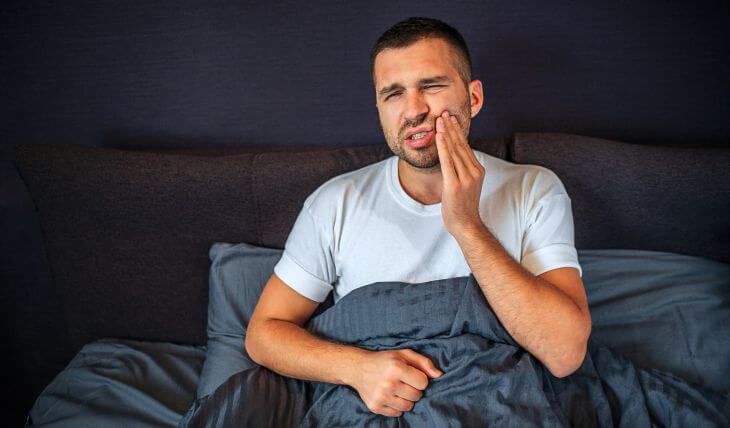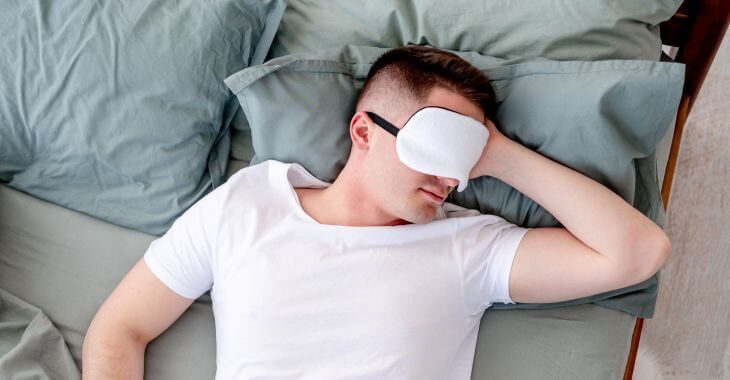Extreme Tooth Pain, Can’t Sleep? Here’s What You Need to Know

When extreme tooth pain keeps you up at night, the discomfort can feel unbearable. Tooth pain can often intensify at night, making it difficult to get the rest you need. Understanding why tooth pain worsens at night and exploring ways to manage it can help you find relief and improve your sleep.
Why Is Tooth Pain Worse at Night?
Tooth pain can feel especially intense at night for several reasons. When lying down, blood flow to the head increases, which can put extra pressure on sensitive nerves around the tooth. The absence of distractions can also make pain feel more noticeable as you focus on trying to fall asleep.
Another factor is the body’s natural pain-suppression cycle. During the day, our bodies release endorphins and other chemicals that help dull pain. At night, these chemicals decrease, causing pain signals to become more prominent.
Extreme Tooth Pain, Can’t Sleep? Home Remedies for Tooth Pain Relief
For those wondering how to sleep with a toothache, finding ways to reduce discomfort is key. While seeing a dentist is the best solution for addressing tooth pain, there are some home remedies you can try to ease discomfort and allow you to rest more comfortably.
1. Saltwater Rinse
A warm saltwater rinse is a classic remedy for tooth pain and can help reduce inflammation. To make a saltwater rinse, dissolve one teaspoon of salt in a glass of warm water and swish it around your mouth for 30 seconds before spitting it out.
2. Cold Compress
A cold compress can reduce swelling and numb the area around the painful tooth. Place an ice pack or a cold, damp cloth against the cheek where the pain is for 15-20 minutes at a time. This can reduce pain signals to the brain, making it easier to manage extreme tooth pain at night.
3. Clove Oil
Clove oil contains eugenol, a natural anesthetic that can numb the area around a painful tooth. Apply a small amount of clove oil to a cotton ball and dab it on the affected area. Be careful to avoid swallowing the oil, as it can irritate the stomach.
4. Over-the-Counter Pain Relievers
For temporary relief, over-the-counter pain relievers like ibuprofen or acetaminophen can reduce pain and inflammation. Taking these medications as directed may help you rest through the night without being overwhelmed by tooth pain.
How to Sleep with a Toothache
When extreme tooth pain prevents you from sleeping, adjusting your sleeping position and environment can sometimes help reduce discomfort. Try these tips to get some much-needed rest:
- Elevate Your Head: When you lie flat, blood flow to the painful area can increase, intensifying the throbbing sensation. Elevating your head with an extra pillow can help reduce blood flow to the tooth, making the pain more manageable.
- Avoid Certain Foods and Beverages: Before bed, avoid foods and drinks that are overly cold, hot, acidic, or sugary, as these can aggravate tooth pain. Stick to room-temperature water and avoid late-night snacking that could worsen pain.
- Keep a Cool Compress Nearby: Keeping a cold compress by your bedside can be helpful if the pain flares up during the night. This allows you to quickly apply it to the affected area, which can help numb the pain and make it easier to return to sleep.
- Limit Late-Night Stimuli: Since the mind is more focused on pain at night, creating a calming sleep environment can make a difference. Avoid electronic screens, bright lights, and other stimuli that may make it harder to relax.
When to See a Dentist for Extreme Tooth Pain
Extreme tooth pain, can’t sleep? While home remedies and adjustments can help you sleep with tooth pain, persistent or severe tooth pain should be addressed by a dental professional.
If you’re experiencing extreme tooth pain that doesn’t subside or if there are additional symptoms like swelling, fever, or discharge, it could be a sign of a more serious issue, such as an abscess or infection.
Delaying treatment for intense tooth pain can result in complications that may require more extensive care, like a root canal or tooth extraction. In cases of extreme tooth pain, the sooner you seek help, the better the chances of preserving the tooth and avoiding additional discomfort.
Getting Relief When You Have Extreme Tooth Pain, Can’t Sleep
Experiencing extreme tooth pain that disrupts sleep is a frustrating and painful ordeal, but understanding why the pain is worse at night and knowing a few home remedies can make a difference.
Remedies like saltwater rinses, clove oil, and a cold compress can offer temporary relief, while sleep adjustments like elevating your head and maintaining a soothing environment can help you rest more comfortably.

While these measures may provide short-term relief, visiting a dentist is the only way to address the root cause of tooth pain and receive effective treatment. Don’t hesitate to seek professional help for severe or persistent tooth pain to prevent further complications and regain your quality of life.
The information provided on this website, including text, graphics, images, and other materials, is intended solely for informational purposes and should not be used as a substitute for professional medical advice, diagnosis, or treatment.




)